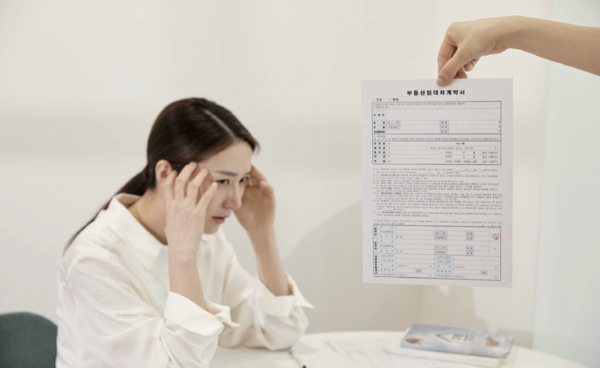On October 8th, 2023, a massive jeonse fraud involving 150 cases in Suwon City was exposed to the media following a report by an anonymous person. As of October 14th, the total amount of losses in Suwon City alone reached about ₩87 billion according to the police. Therefore, the Sungkyun Times (SKT) now examines the current real estate market in Korea, which underlies the background of jeonse fraud, and explores the issues and potential solutions related to it.
Renting a House
- Real Estate
Residential types in South Korea are generally categorized into three types: purchase and sale, monthly lease, and jeonse. Owning a house by purchasing it provides a stable living environment since the buyer can fully own the house, and paying monthly rent is a globally prevalent method due to its convenience. Finally, jeonse, also called a key money deposit, is a unique housing rental system found only in Korea. Under the system, the tenant deposits a lump sum with the landlord for a certain period, and at the end of the contract, the full deposit is returned to the tenant. This unique system of jeonse has persisted since the 1970s because of the rapid population growth and economic development of Korea. The system continued even into the 2000s due to its unique characteristics that satisfy both landlords and tenants. Nowadays, it has become one of the most popular types of residential contracts in Korea. In October, the KoreaJoongAng Daily reported that 62% of apartments in Seoul were rented under jeonse contracts.
- Fundamentals of Jeonse Fraud
Approximately 50 years since its introduction, economic and social conditions have changed a lot, and various kinds of fraud exploiting the jeonse system have become rampant. Jeonse fraud refers to the landlord deceiving the tenant, making it impossible or difficult for the tenant to recover their deposit. The essence of the jeonse system is that the tenant entrusts a deposit to the landlord, rents the house, and receives the deposit back when the contract period ends. Hence, if the trust between the contracting parties is broken or when the whereabouts of the deposit becomes unclear, jeonse fraud may occur. Currently, jeonse fraud can be divided into two main patterns. Firstly, when the property value falls below the jeonse deposit and creates a tin can jeonse, the possibility of jeonse fraud increases. If house prices rise, the landlord can gain a profit margin with the deposit, but if the prices fall, the landlord may not be able to refund the deposit even after selling the property. Second, information asymmetry between landlords and tenants creates contractual defects that facilitate the crime. Landlords may use agents to intercept deposits or make multiple contracts for a single property. These days, the issue becomes more severe as these fraudulent crimes occur on a national scale, resulting in astronomical losses in the market.
Jeonse Fraud as a Crime
- Exploitation of the System
The issue of jeonse fraud can be examined from two perspectives: gap investment and the exploitation of the Housing Lease Protection Act (HLPA). First, the gap investment within the jeonse system involves purchasing houses by exploiting the gap between the house price and the jeonse deposit. Landlords can invest in housing without capital by using the tenants’ deposit. By putting the newly purchased house back on the market as jeonse, they can expand speculation and continuously inflate the real estate market. This form of speculation allows landlords to buy more houses, especially those already owning several properties. The problem is that if house prices decline after landlords purchase multiple properties expecting them to rise, tenants are left to bear the substantial loss of the deposit. Furthermore, despite the HLPA aiming to stabilize tenants' living conditions, jeonse fraud exploits the loopholes of the act. Under the current regulation, there is no provision requiring landlords to explain information such as national taxes and real estate market prices to tenants. In April, Choi Eun-young, the head of the Korea Urban Research Institute, stated, “Tenants are signing contracts without enough information.”
- Victims in a Catch-22 Situation

Jeonse assumes that property values will continually rise, allowing landlords to profit from jeonse deposits. However, the recent excess supply of housing has led to declining real estate interest rates while creating uncertainty for landlords in returning deposits, ultimately burdening tenants. For instance, Mr. Kim, a resident of Seocho District, has switched to renting monthly due to fears of deposit fraud. He told SKT about the concerns of jeonse fraud, stating, “Considering the current jeonse crisis, entrusting a large deposit to a stranger is too risky.” Despite this uncertainty regarding deposit returns, there is a lack of policies to aid victims who have already lost their deposits to jeonse fraud. Moreover, even if the landlord is punished, there is still an issue where tenants cannot fully recover their deposits. To address the issue, the government announced a special act for jeonse fraud victims on June 1st, 2023. As a result, victims now have the priority to purchase their former houses at auction; however, as the auction price is often only 60% of the original property value, recovering the full deposit is not likely to be assured. Additionally, there exists a structural problem where the victims are compelled to take on additional debt. In May 2023, Kim Dong-yeon, the governor of Gyeonggi Province, reported, “The maximum amount of the deposit recoverable through auctions is too low, resulting in many victims being evicted without recovering a penny.”
To-Do’s for Jeonse Fraud
- Preventative Measures
Jeonse fraud can be prevented through the empowerment of agents and the supplementation of laws. To prevent the gap investment, the real estate agents’ authority must be expanded. Since most contracts are made through them, strengthening their jurisdiction can be effective. Through this, tenants who unknowingly enter tin can jeonse contracts can be provided with information. In April this year, Park Soon-nam, the vice-chairman of the Michuhol District Jeonse Fraud Victim Countermeasure Committee, stated, “Real estate agents should have the duty to disclose any concerns about jeonse fraud during contract signing.” Furthermore, legislation can be added that makes it impossible for landlords to refuse when tenants request information. Given the rule of transactions that rely on personal trust, simply being aware of the details in the contract can successfully remove many risks for the victims. Additionally, legal mechanisms should be further specified to easily trace any arrears after the contract. Both the misuse of the system and the rise in housing prices can be addressed effectively by this measure.

- Post-Fraud
One solution could be amending the top priority right to compensation under the HLPA, which targets jeonse fraud victims. This involves specifying a certain amount of the deposit that can be reimbursed as a priority, even if another entity, such as a bank, has the priority to purchase the auctioned house. An increase in repayment could provide direct assistance to victims burdened with debt. In fact, as of May this year, there was a case where the repayment was raised from ₩37 million to ₩50 million. Considering the nationwide scale of victims, expanding the range of such policies would be necessary. Therefore, the repayment method needs to be refined to secure actual residences. Baek (Junior, Department of Philosophy), living in a jeonse house, told the SKT, “I wish there were reliable institutions or policies for the tenants.” Additionally, public corporations specializing in housing stability, such as the Korea Housing & Urban Guarantee Corporation (HUG), should offer temporary housing for victims. In July, the Korea Land and Housing Corporation (LH) proposed an amendment to the Special Act for Victim Support by expanding the number of public rental housing. At that time, LH proposed enforcement decrees such as providing LH and Local City Corporation rental housing to victims for up to two years. Likewise, the HUG should guarantee the housing rights of victims of large private loans. In short, HUG must continue to ensure the reliability of the citizens by strengthening its responsibility.

Amidst the reality of increasing debts, jeonse fraud is a serious issue that causes substantial financial loss for tenants. It should not merely be seen as an individual case of fraud but recognized as a national crisis, necessitating an immediate shift in perspective and the establishment of effective policies.
